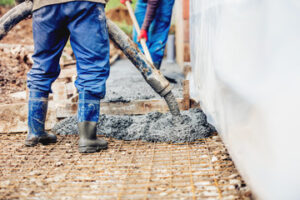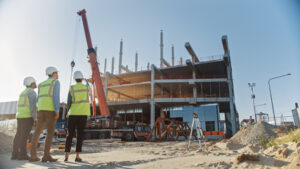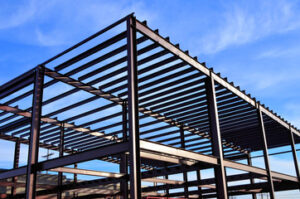Concrete Contractors Columbus are specialized professionals that work with concrete projects of all sizes. These contractors can make sure your project is done correctly the first time, and will last for years to come.

The best way to find a good concrete contractor is by asking for references from previous clients. Ask them about the contractor’s experience, and if possible, visit some of their past work.
When hiring a concrete contractor, you want to ensure that they have the experience and skills required for your specific project. You can evaluate the quality of their work and professionalism by examining their past projects, reputation, licensing, communication skills, and attention to detail. Choosing an experienced and reliable contractor will help you avoid costly construction delays and mistakes and will ensure the highest quality of results.
Professional concrete contractors have the technical knowledge and industry expertise gained from hundreds or thousands of past projects. This includes a strong understanding of the concrete’s properties, construction techniques, and building codes. They also know how to mix, pour, and finish concrete correctly to achieve the desired outcome. Additionally, they can identify potential issues and troubleshoot problems before they arise, saving time and money.
The best concrete contractors are dedicated to providing high-quality customer service and will go out of their way to ensure a smooth construction process. They are skilled at listening to clients’ ideas, concerns, and preferences and will provide clear explanations with expert advice throughout the project. In addition, they will communicate clearly with you about project timelines and costs to avoid misunderstandings.
A good concrete contractor will be licensed and insured, which is a requirement for working on construction projects. You should also ask for references from previous clients, as this will give you a better idea of the contractor’s reliability and skill level. You should also look for reviews and testimonials on social media and other online platforms.
Concrete is a versatile construction material that can be used for a wide variety of purposes. Its durability and strength make it an ideal choice for many different construction projects. However, the construction of a concrete structure requires careful planning and execution to ensure that it meets the client’s needs and specifications. A good concrete contractor will take the time to understand the unique requirements of each project and will use the proper construction techniques to ensure that the end result is high-quality and durable. They will also work closely with architects and engineers to ensure that the concrete work is in compliance with building regulations and codes.
Free Estimates
Concrete contractors are essential to construction projects. They bring concrete designs and plans to life by turning them into functional, aesthetically pleasing structures. They also work closely with architects and engineers to ensure that the concrete work seamlessly integrates with the overall design and structural requirements.
When choosing a concrete contractor, it is important to get a free estimate before hiring them. This will help you compare prices and find a contractor that fits your budget. It is also a good idea to ask for references from previous customers. This will give you a better idea of the contractor’s customer service and professionalism.
Some concrete contractors may only give a square foot price over the phone, while others will want to visit the job site to give a more accurate estimate. It is important to get quotes from multiple contractors to make sure you are not overpaying.
Choosing a concrete contractor is a big decision, and it is important to choose one who has experience and is qualified for the job. You should also check if the company is licensed and insured. This will protect you in case something goes wrong during the project.
It is also important to look for a company that has a strong reputation in the industry. This will help you feel confident that the company will do a good job and won’t scam you. You can also check online reviews to see what other people have said about the company.
Finally, it is important to hire a concrete contractor with a long-term warranty. This will guarantee that their work is high-quality and will last for a long time. Moreover, it will show that the company is committed to customer satisfaction and quality. In addition, it will also provide peace of mind that the company will stand behind their work if any problems occur in the future. By following these tips, you can find a reliable concrete contractor that will do a great job on your project.
Insurance
The concrete contracting industry is a crucial part of construction projects. However, the job is also dangerous and exposes workers to many risks. For example, they are exposed to heavy machinery and dangerous materials. Moreover, they often work in awkward positions and may be susceptible to physical injury. In addition, they must handle chemicals that are harmful to the environment if not handled properly. This makes insurance coverage a necessity for concrete contractors.
Liability insurance is the foundation of any business. It covers damages or injuries caused by the business itself, its employees, or its property. It can also cover the cost of legal fees. Without it, a concrete contractor could be forced to pay costly fines or even go out of business. Additionally, clients prefer working with a contractor that is insured.
A reputable concrete contractor will carry general liability, professional liability, worker’s compensation, commercial auto, and property insurance. This insurance will protect the company from financial losses and will ensure the project runs smoothly. It will also help to build client confidence and loyalty.
While accidents are rare, they do happen. For instance, a client may trip over a wire during excavation. Or, they may get chemical burns when handling wet concrete. Worker’s compensation is a vital form of protection for concrete contractors as it helps them manage the costs of workplace injuries. It covers medical care and a portion of lost wages. This helps them focus on recovery without worrying about the financial implications of a work-related injury.
Insurance can be expensive, especially for businesses that deal with hazardous materials and heavy machinery. This is why you should consider getting a quote from a specialist concrete contractor insurance broker. These brokers specialise in high risk trades and will compare different providers to find you the best deal at an affordable price.
A reputable concrete contractor will be willing to provide you with proof of insurance prior to starting the project. This is a sign that they take their responsibilities seriously and want to avoid any potential liabilities. It is also a good way to show that they are committed to their craft and will do everything they can to complete the project on time and within budget.
Reputation
The reputation of a concrete contractor is an important factor in selecting the best provider for your project. A reputable contractor is trustworthy, experienced, and committed to quality work. They understand the importance of meeting deadlines and delivering results within budget. They are also reliable and communicate effectively with clients throughout the construction process. This ensures a positive experience and quality results.
The best way to evaluate a concrete contractor is to ask for references and review their past projects. This gives you a good idea of their skills and expertise and allows you to see the final product in person. You can also look for signs of wear and tear, which will help you determine the longevity of the concrete work.
It is also a good idea to request a comprehensive cost estimate from multiple contractors. This will allow you to compare the estimates and make an informed decision based on your specific requirements. The estimates should include a breakdown of costs, materials, timelines, and any additional relevant details. This will prevent any surprises and unnecessary expenses down the road.
When working with a concrete contractor, be sure to clearly communicate your expectations and design preferences. A reputable contractor will be open to hearing your ideas and providing recommendations based on their own expertise. They will also be able to address any concerns that you may have and provide solutions to ensure that your project is successful.
When selecting a concrete contractor, it is important to check their credentials and insurance coverage before hiring them for your project. A reputable contractor will have the necessary licenses to operate in your area and will maintain adequate liability and workers’ compensation insurance coverage. In addition, they should be a member of professional associations for concrete contractors, which demonstrates their commitment to upholding industry standards and professionalism.

